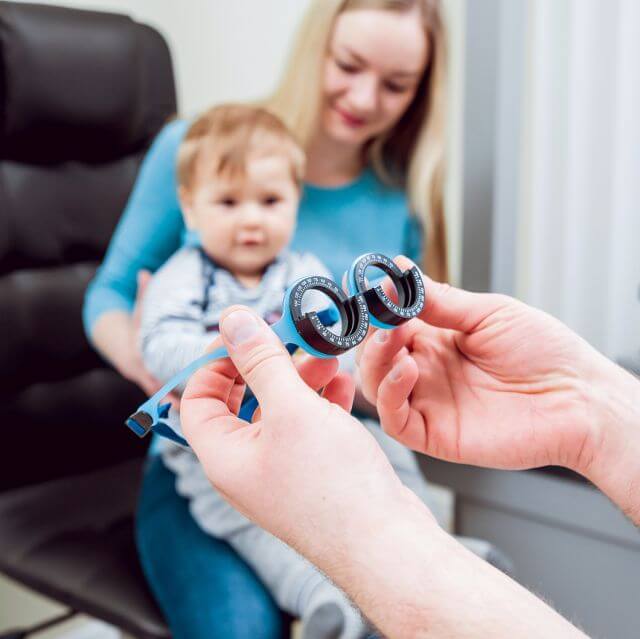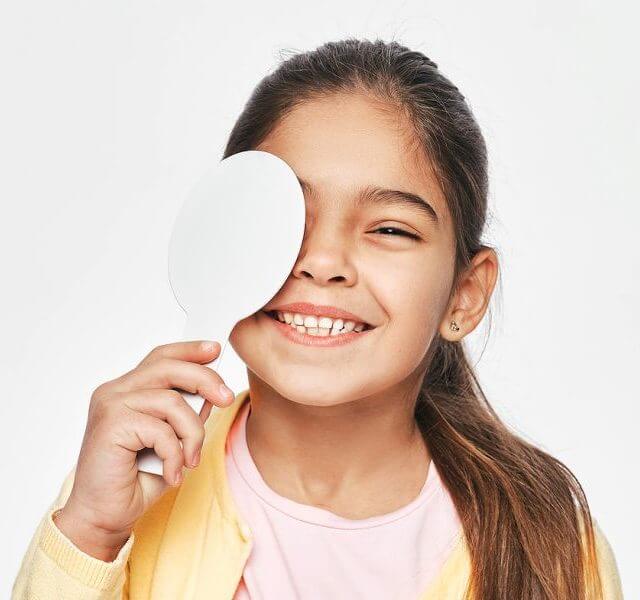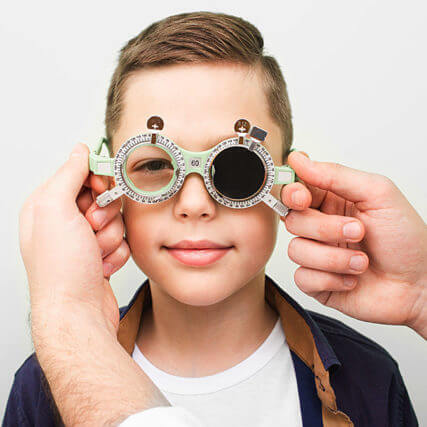Children's Eye Care
Children should have their first eye exam before their first birthday (and great news-it is FREE through our participation in Infantsee). Unless there are concerns, we recommend their first exam should be when the child is between 9 and 12 months to be most effective. After the first exam, annual exams are recommended to ensure that your child's eyes are being closely monitored for any changes as they develop and grow
Your child’s vision, well-being, and happiness are very important to us. At The Solution Center, we enjoy working with children and are passionate about providing children with the care that that they deserve. We believe there should not be “one size fits all vision care” and we work hard to accommodate the needs of each child.
Children's Comprehensive Vision Exams
Your First Step Toward Healthy Vision For Your Child is a Comprehensive Vision Exam by an Experienced Eye Doctor. Your Child Needs This Exam Even If S/He Successfully Passed The Standard Eye Chart Exam. There are several common, yet serious disorders, which are not detected by the eye chart screening.
The American Optometric Association recommends that children receive a comprehensive vision exam by an eye doctor:
- at the age of six months ( read about the InfantSEE program below)
- at three years of age
- at five years of age
- the summer prior to entry into Kindergarten
- yearly during grades K-12
- A child who is found to be at risk for visual problems may need to be examined more frequently as recommended by the child’s eye doctor.


Vision Care Specialist Evaluations
An evaluation with an optometrist who is a developmental/behavioral vision care specialist is a must for any adult or child who is currently experiencing or has had a history of the following:
- learning or reading problems, ADD/ADHD, or dyslexia
- developmental delays, autism, or cerebral palsy
- computer eye strain
- head trauma or stroke
- inconsistent or poor sports performance
- strabismus (eye turn) and/or amblyopia (lazy eye)
Are School Vision Screenings Enough?
Many parents are surprised to learn that vision screenings provided at school or by the pediatrician are not comprehensive vision examinations. These vision screenings typically only detect nearsightedness, in other words, is your child able to see the chalkboard? To be successful in school, near vision, depth perception, and eye tracking are important. These conditions and most eye health problems will go undetected at a vision screening.
A comprehensive eye exam with an eye doctor is the only way to detect many of these disorders which interfere with your child’s learning; some are sight-threatening.


Some common problems that cannot be detected by the eye chart screening include:
- Convergence insufficiency
- Accommodative spasm
- Convergence excess
- Strabismus
- Decreased depth perception
- Farsightedness
- Astigmatism
- Photophobia
- Decreased visual perception and visual processing
- Figure ground deficiencies
- Eye hand coordination deficiencies
Some less common but serious conditions that are not detected by an eye chart screening include:
- Retinal detachment
- Retinal blastoma
- Cataracts
- Diabetes

Frequently asked questions about Children’s Vision
Q: Is it really possible for my infant or toddler to have a comprehensive eye exam? How can the doctor tell what my child is seeing—before she can even talk?
A: At The Solution Center, our eye exams are specifically designed for children at each age and developmental level. We use specially designed equipment and procedures to evaluate your child’s eyesight, eye coordination, depth perception, whether they are nearsighted, farsighted or have astigmatism, visual development and overall eye health. Our passion is children’s vision care.
Q: My pediatrician recommended that I take my son to an eye doctor. How do I choose an eye doctor for my child?
A: It is important to have your child evaluated by an eye doctor who is experienced in children’s vision care. Since vision is more than just 20/20 eyesight, and it affects everyday life experiences such as hitting a baseball, studying for a test and playing computer games, you should select an optometrist who sees children not as an afterthought, but as their primary patient base. At The Solution Center we created an office designed for children of all abilities. When calling an optometrist’s or ophthalmologist’s office, ask if infants are seen for vision care, if the answer is yes, then consider scheduling your child.
A developmental optometrist is going to go beyond evaluating your child’s eyesight, need for glasses and the presence of eye disease. The developmental optometrist will also evaluate how your child uses her eyes to perform in the classroom and on the athletic field. Improving how your child performs visually is the developmental optometrist’s top priority. If you contact an ophthalmologist, a surgeon, he or she will be looking for eye disease which requires surgery. The surgeon will not be addressing how your child performs visually in the classroom or in athletics.
Q: Should my children wear sunglasses when they are at the beach or playing outside?
A: Yes! UV rays are as damaging to your child’s eyes as they are to his/her skin. Children have larger pupils and clearer lenses, so when spending time outdoors, a child will receive 3X’s the UV ray exposure as an adult. Proper sunglasses are sunscreen for the eyes!
UV radiation may cause long term damage to your child’s eyes and may lead to serious eye conditions later in life. Since UV radiation has been linked to the following eye diseases, protecting your child’s eyes now is the best way to protect their vision as an adult. Some of the eye conditions that are associated with exposure to UV radiation include:
- Macular degeneration
- Cataracts
- Dermatochalasis (upper eye lid droop)
- Pterygium (growth on the conjunctiva caused by sunlight)
- Corneal cancer
- Choroidal melanoma
- Early presbyopia
To learn more about the damaging effects of UV exposure and on choosing effective sun protection for your child, please visit our protecting your child’s eyes page.
